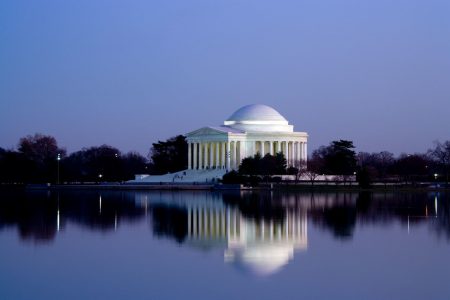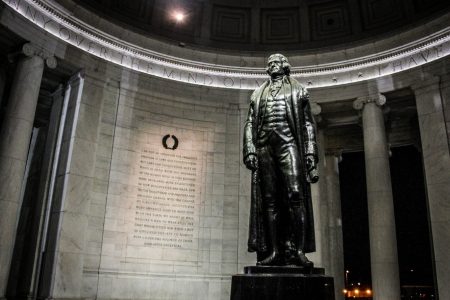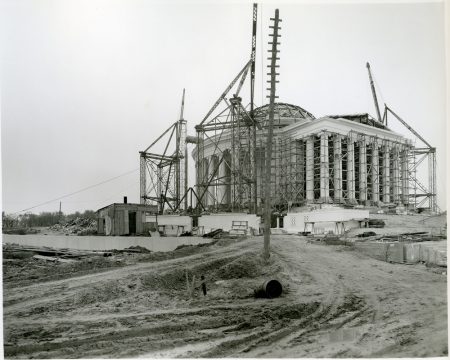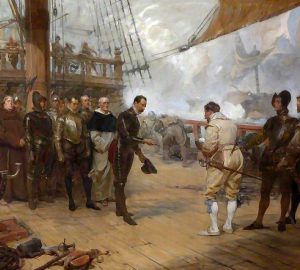
Washington, D.C. is full of iconic monuments, but one of the most famous has to be the Jefferson Memorial. Built 1939 – 1943 to honor our third president, it was identified as America’s favorite monument in a 2007 survey.1 Yet the millions of tourists that visit it every year do not realize that the huge quotes on the wall range from improperly referenced to pure fabrications. The real history of Jefferson was deliberately distorted by its builders to serve their own purposes.
A major part of the monument is four huge panels around the inside of the monument engraved with quotes from Jefferson. This is where the issues appear. We’ll skip two of the panels, those on the southeast and southwest of the monument. They do have technical inaccuracies: one skips parts of Jefferson’s original words without using ellipses to show that (even though they are used elsewhere on the inscriptions), and the other includes some phrases from the Declaration of Independence that were added by the convention and were not in Jefferson’s draft.
We can find some more serious problems in the northwest panel:
Almighty God hath created the mind free…All attempts to influence it by temporal punishments or burthens…are a departure from the plan of the Holy Author of our religion…No man shall be compelled to frequent or support any religious worship or ministry or shall otherwise suffer on account of his religious opinions or belief, but all men shall be free to profess and by argument to maintain, their opinions in matters of religion. I know but one code of morality for men whether acting singly or collectively.
Most of this is extracted from the Virginia Statute for Religious Freedom, drafted by Jefferson in 1777. This is entirely appropriate to have on Jefferson’s national monument, as he requested that he be remembered on his tombstone for this, along with writing the Declaration of Independence and being the father of the University of Virginia.2 The last sentence, however, has no connection to the rest. It is from a letter by Jefferson to James Madison of August 28, 1789 in which Jefferson was arguing that the United States ought to act with gratitude in her foreign policy, because, “If the morality of one man produces a just line of conduct in him, acting individually, why should not the morality of 100 men produce a just line of conduct in them acting together?”3 Its inclusion on the panel is deceptive. Jefferson did not include that thought in his religious freedom bill. Its inclusion here is also wholly unnecessary. It is not entirely clear what that sentence would mean in this foreign context, but an impartial reader would certainly not take it in the context that Jefferson meant it in his letter to Madison.

The worst flaws are found in the last panel – the northeast:
God who gave us life gave us liberty. Can the liberties of a nation be secure when we have removed a conviction that these liberties are the gift of God? Indeed I tremble for my country when I reflect that God is just, that his justice cannot sleep forever. Commerce between master and slave is despotism. Nothing is more certainly written in the book of fate than these people are to be free. Establish the law for educating the common people. This it is the business of the state to effect and on a general plan.
Jefferson never said this. This quote was fabricated by stealing phrases from five separate writings by Jefferson, written over a span of nearly five decades, from his 1774 work A Summary View of the Rights of British America to his 1820 autobiography.4 We need not go phrase by phrase, one example will suffice. From his autobiography:
Nothing is more certainly written in the book of fate than that these people are to be free; nor is it less certain that the two races, equally free, cannot live in the same government. Nature, habit, opinion, have drawn indelible lines of distinction between them.5
It takes only a look at the next sentence to see that Jefferson’s words are being twisted on his grandest monument. He did write that emancipation would need to take place, yet he believed it imperative that freed slaves be deported out of the country. Using the first part of the quote with no mention of the rest is a complete whitewashing of history.

The reason for this frankenstein of a quote is rather straightforward. The Jefferson Memorial was built during the presidency of Franklin Delano Roosevelt. There was every motivation to try and make it as clear as possible that Jefferson, the heroic founding father and founder of the Democratic party, was the source of the policies currently being pushed by the part.
Historical figures ought to be honored for who they were, not who we wish them to have been. We should depict them accurately, neither demonizing them, nor remaking them in our own image. A monument with a distorted quote like this one would be more fitting in Moscow’s Red Square than in Washington, DC. As long as this fabricated quote remains inscribed on those marble walls, it is a slap in the face to any national ideal of truth in the public square.

Footnotes
1. Marked fourth overall, and the first monument. American Institute of Architecture, 2007. AIA Reveals Public’s Choice America’s Best Architecture. Available at: <https://info.aia.org/aiarchitect/thisweek07/0209/0209n_150bldgs.htm> [Accessed 03 March 2021].
2. Thomas Jefferson, Design for Tombstone and Inscription, Available at: https://founders.archives.gov/documents/Jefferson/98-01-02-6185 [Accessed 03 March 2021].
3. Thomas Jefferson to James Madison, 28 August 1789. Available at: https://founders.archives.gov/documents/Jefferson/01-15-02-0354 [Accessed 03 March 2021].
4. Details of the sources for each phrase can be found here https://www.monticello.org/site/research-and-collections/quotations-jefferson-memorial.
5. Thomas Jefferson, Autobiography. Available at: https://founders.archives.gov/documents/Jefferson/98-01-02-1756 [Accessed 03 March 2021].





The panels are sequential, from left to right (clockwise) beginning with the Declaration (and are numbered 1-4 accordingly), with the intent that visitors will see the familiar Declaration phrases as they enter on the North, and read the “quotes” in order. In light of that, and in the context of FDR’s extra-constitutional New Deal agenda and similar schemes, Panel 4’s redacted passage from the Samuel Kercheval letter (1816) might be the most insidious in some ways. Compare the public quote with its original, and notice what was left out.
Thanks for the comment. I hadn’t considered how the panels worked together from one to another.
The statement that Jefferson was the “founder of the Democratic Party” is inaccurate in any context, but especially in the context of supporting the allegation the memorial was built for politically nefarious reasons – to support Democrat FDR’s agenda of the 1930’s – 150 years after Jefferson.
“…Jefferson, assisted and advised by Madison, established the rudiments of the first opposition party in American politics under the Republican banner.”
http://www.britannica.com/biography/Thomas-Jefferson/Party-politics
It should go without saying that today’s Republican Party is not the Republican Party of Jefferson or Madison.
Jefferson founded the Democratic-Republican Party, and the Democrat Party of the 1930s (and the 2020s) traces its lineage directly to it. The Republican party began some decades later, mainly from the imploded Whig party, who were the Democrats’s opponents.
I didn’t say that the memorial was built for the simple reason of supporting Roosevelt’s agenda – I said that the choice of quotes (or misquotes) used on the monument makes sense in light of his administration’s agenda. Would you expect Roosevelt to build a monument and highlight Jefferson’s positions which he strongly opposed?
The possessive form of “it” is “its,” not “it’s.” Unless… you’re Thomas Jefferson.
Thanks, I’ve made that correction.
I’m not prepared to confirm or deny at this point whether I am Thomas Jefferson.